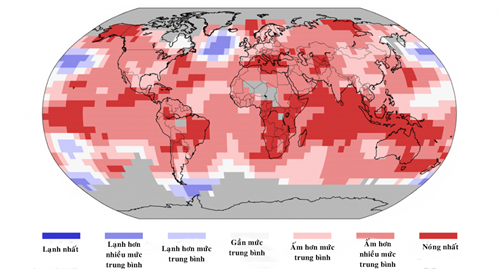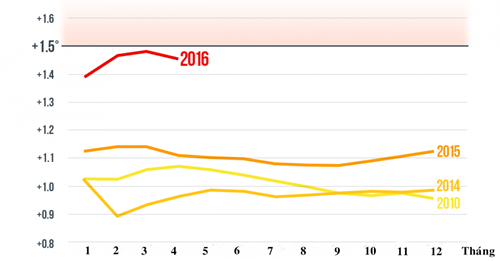2016 could be the hottest year on record
Many meteorological agencies around the world warn that 2016 will continue to break records and become the hottest year in history.
 |
Land and ocean temperatures from January to April 2016. Photo: NOAA. |
According to Scientific American, the US National Aeronautics and Space Administration (NASA) and the US National Oceanic and Atmospheric Administration (NOAA) assessed last April as the hottest April in history, and the 12th consecutive month setting a record for the highest monthly temperature, due to the resonance of climate change with the El Nino phenomenon.
Global temperatures are about 1.5°C above the pre-industrial average. Specifically, the average temperature in April 2016 was 1.1°C above the 20th-century average April temperature (13.7°C) and 0.3°C above the record set in 2010.
The US non-profit organization Climate Central reanalyzed the average temperature data for the first months of this year from NASA and NOAA, and compared them with the average from 1881 to 1910. The results showed that the average temperature from January to April of 2016 was 1.45°C higher than the period from 1881 to 1910.
In 2015, at the COP21 global climate change conference held in Paris, France, governments pledged to keep the Earth's temperature from rising more than 2°C by the end of this century, compared to pre-industrial times. The current average global temperature is about 15°C.
"Average monthly temperatures are surpassing previous temperature records, and this will happen more often," said Michael Mann, a climate expert at the University of Pennsylvania, USA.
Countries are making efforts to cut carbon dioxide (CO2) and many other greenhouse gases to achieve the above goal. According to NOAA, the concentration of CO2The global monthly average reached a record high, surpassing 400 parts per million (ppm) in March 2015. The average rate of increase in atmospheric CO2 concentration from 2012 to 2014 was 2.25 ppm/year.
 |
Average temperature in the first four months of 2016 and the years 2010, 2014, 2015, compared to the average for the period 1881 - 1910. Photo: Climate Central. |
"This is a milestone that shows that humans burning fossil fuels is causing CO2 concentrations2“Global temperatures have increased by 120 ppm since pre-industrial times,” Earth Sky quoted Pieter Tans, a greenhouse gas expert at NOAA.
The El Nino phenomenon is showing signs of weakening, causing average monthly temperatures to gradually decrease, but temperatures are still significantly higher than in 2015.
According to Gavin Schmidt, head of NASA's Goddard Institute for Space Studies, with temperatures in the first months of 2016, there is a 99% chance that this year's average temperature will be higher than last year's and become the hottest year in history.
According to VNE
| RELATED NEWS |
|---|


